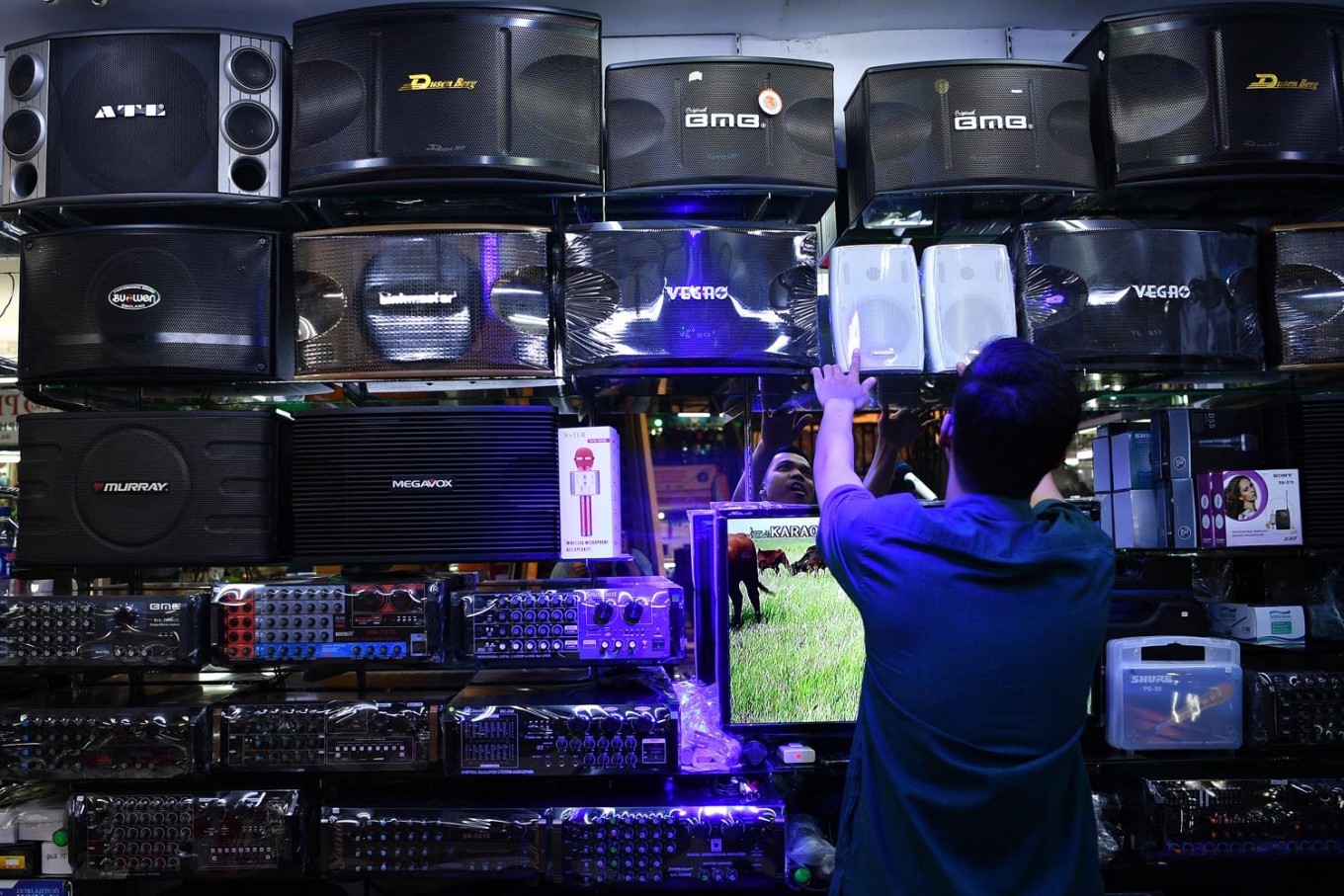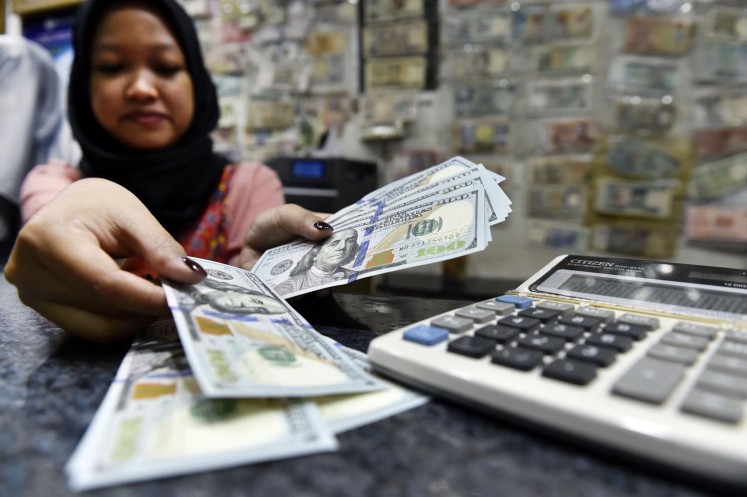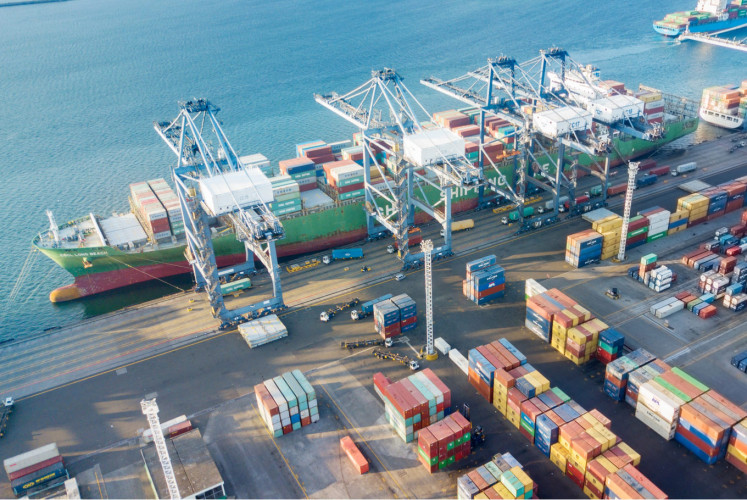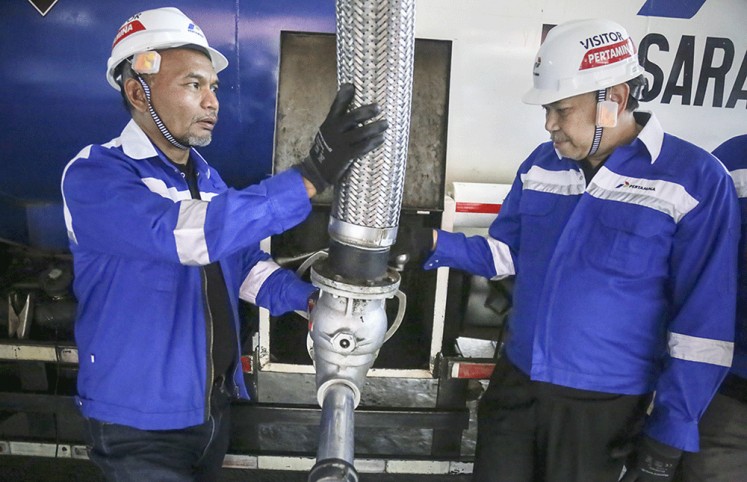Popular Reads
Top Results
Can't find what you're looking for?
View all search resultsPopular Reads
Top Results
Can't find what you're looking for?
View all search resultsGlobal trade war, upcoming elections weigh on the economy this year
The Jakarta Post looks back on the ups and downs of 2018. Here is part one of two of the review.
Change text size
Gift Premium Articles
to Anyone
D
espite signs of recovery in some sectors, this year’s high level of dynamism in the global and domestic economy shows that 2018 might just have been the most challenging year for Indonesia under the administration of President Joko “Jokowi” Widodo.
From the outside, global economic turmoil that arose from monetary tightening in developed markets, the trade war between the world’s two economic behemoths and volatility in oil and commodity prices has affected Indonesia.
From the inside, while the rupiah's exchange rate has started to recover, businesses are still wary that political tensions could mar the economy and investment climate with the 2019 presidential and legislative elections nearing, which will see incumbent President Joko “Jokowi” Widodo and his rival in the 2014 election, Prabowo Subianto, battle it out again amid an increasingly polarized society.
The Jakarta Post looked back on the ups and downs of 2018, and here is part one of two of the review, compiled by Marchio Irfan Gorbiano, Norman Harsono, Rachmadea Aisyah, Riska Rahman, Riza Roidila Mufti, Stefanno Reinard Sulaiman and Winny Tang.
Read also: Not all bad in 2018: Indonesian economic review
Macroeconomy
The volatility of the rupiah against the US Dollar, as well as with other emerging market currencies, was among the highlights of this year, as the positive outlook held early this year turned south because of large uncertainties in the global economy. In early September, the rupiah's value reached Rp 15,000 per US dollar.
The United States Federal Reserve’s monetary normalization policy and trade tensions between the US and China were widely cited as drivers of volatility in emerging markets, including Indonesia.
The volatility of the rupiah against the US Dollar, as well as with other emerging market currencies, was among the highlights of this year, as the positive outlook held early this year turned south because of large uncertainties in the global economy. (Antara/Puspa Perwitasari)The rupiah's volatility prompted Bank Indonesia (BI) Governor Perry Warjiyo, who replaced Agus Martowardojo in May, to make stabilizing the currency his priority by raising BI’s policy rate – the seven-day reverse repo rate – six times throughout the year.
Amid the volatility of the rupiah, the government made the unusual decision to not revise the 2018 state budget. Finance Minister Sri Mulyani Indrawati said it was the first time in the Reform Era that the government had stuck with its budget throughout the fiscal year.
The decision was made as the government projected its revenue will slightly surpass the Rp 1.89 quadrillion (US$130.52 billion) target set in this year’s budget as weaker the rupiah, coupled with higher oil prices than assumed in the budget, was expected to drive up non-tax revenue collection.
Stock market
The performance of the Jakarta Composite Index (JCI) has been volatile throughout 2018, mainly caused by continued trade tension between the US and China and aggressive federal funds rate hikes that prompted a massive sell-off in emerging markets, including in Indonesia.
Domestic issues have also had an impact on the JCI with the latest being the wide trade deficit of $2.05 billion in November, the biggest trade gap since July 2013, as exports plunged and added pressure to the rupiah.
With such negative global and domestic sentiment, the JCI slumped from its high at around 6,600 at the beginning of this year to below 6,000, although it bounced back to 6,163 as of Dec. 21. On average, the JCI was corrected by 3.02 percent year-to-date.
The Indonesia Stock Exchange reported 57 companies held initial public offerings (IPO) throughout 2018, with a total value of Rp 15.9 trillion. The figure was higher than in 2017 when 38 companies went public.
Trade
The trade deficit, as well as the slowdown in industrial and investment growth, has left the country scrambling to maintain the wellbeing of the economy.
The trade deficit, as well as the slowdown in industrial and investment growth, has left the country scrambling to maintain the wellbeing of the economy. (Shutterstock.com/Creativa Images)Statistics Indonesia recorded the year-to-date trade deficit at $7.52 billion as of November, a stark contrast to the surpluses posted in 2015, 2016 and 2017 at $7.83 billion, $8.48 billion and $12.08 billion respectively.
The government noted the cause of the deficit as a combination of pressures coming from the trade feud between the US and China, which has led to dwindling export demand, in addition to the high volume of imports of crude oil, despite its trend of decreasing prices, as well as raw materials and consumer goods.
Several policies have been rolled out to curb the imbalance, including by imposing a higher tax on 1,147 imported consumer goods and implementing the nationwide mandatory use of 20 percent blended biodiesel (B20).
Manufacturing
The Industry Ministry has targeted a slight improvement in this year’s non-oil and gas industrial growth from 4.88 percent last year to 5 percent this year.
The ministry expects the sector to make up 72 percent of overall exports by the end of the year. Its revenue is also expected to contribute 17.66 percent to the country’s GDP, down from last year’s 20.16 percent.
As of November, none of the industrial mainstays, such as food and beverages, machinery and basic metals, recorded double-digit growth, unlike last year when food and beverages secured 13.7 percent growth.
Investment
Amid persistent global and domestic uncertainties, Indonesia booked 4.3 percent year-to-date growth in investment in September at Rp 535.4 trillion, the Coordinating Investment Board (BKPM) has reported. The growth is a steep decline compared to 13.2 percent growth recorded last year.
Slowing foreign investment seems to be the driver of the slowdown as the country saw a 7.8 percent decline in the third quarter compared to the same period last year. In response, the BKPM adjusted the investment target to Rp 730 trillion from Rp 765 trillion.
Quarterly growth has been declining since the second quarter despite the introduction of several incentives to lure investment. Last month, President Jokowi established the 16th economic package containing an expanded tax holiday, more access for foreign funds and tax cuts for exporters who allow their revenue to enter the state’s financial system.
Energy
Energy policies throughout 2018 have been inseparable with the cabinet’s goal to maintain the people's purchasing power, a populist move by the administration ahead of the 2019 presidential election.
The Energy and Mineral Resources Ministry’s oil and gas director general, Djoko Siswanto (left), is pictured with state energy giant Pertamina logistics, supply chain and infrastructure director Gandhi Sriwidodo while filling a fuel tank truck with 20 percent blended biodiesel (B20) in Batam on Saturday. Djoko said a program introduced in August on the mandatory use of B20 had reached 80 percent of its target. (Antara/MN Kanwa)Earlier this year, President Jokowi ordered the Energy and Mineral Resources Ministry to ensure the affordability of fuel and electricity until 2019, which translated into policies from a price cap on coal for coal-fired steam power plants (PLTU) to mandating state-owned oil and gas holding company Pertamina to seek the government’s permission before increasing non-subsidy fuel Pertalite prices.
The policies have adversely affected the financial performance of Pertamina and state utility company PLN. Moreover, the government did not allocate direct subsidies to cover the firms’ reduced margins.
The US-China trade war that contributed to the rupiah's depreciation, coupled with fluctuating global prices for crude oil and coal, has led to higher production costs for both firms and reduced their profit margins even further.
This year, the government rolled out measures to lower the volume of oil imports by introducing the mandatory use of B20 on Sept. 1. Proponents of renewable energy have raised concerns that the B20 policy would wane the country’s spirit in boosting renewable energy because it would further lower fossil fuel prices. (evi)













